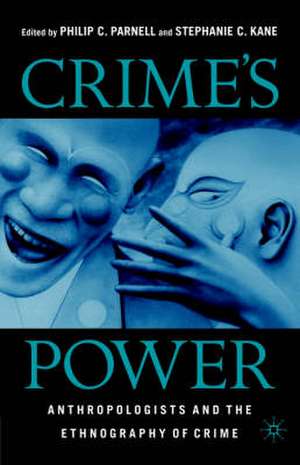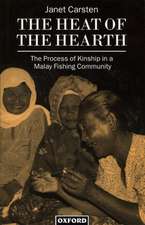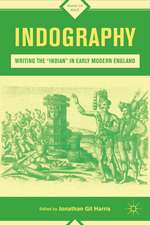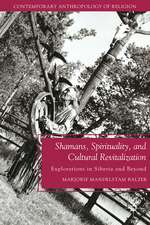Crime's Power: Anthropologists and the Ethnography of Crime
Editat de P. Parnell, S. Kaneen Limba Engleză Paperback – 20 ian 2004
| Toate formatele și edițiile | Preț | Express |
|---|---|---|
| Paperback (1) | 638.24 lei 6-8 săpt. | |
| Palgrave Macmillan US – 20 ian 2004 | 638.24 lei 6-8 săpt. | |
| Hardback (1) | 642.18 lei 6-8 săpt. | |
| Palgrave Macmillan US – 20 ian 2004 | 642.18 lei 6-8 săpt. |
Preț: 638.24 lei
Preț vechi: 750.88 lei
-15% Nou
Puncte Express: 957
Preț estimativ în valută:
122.17€ • 132.74$ • 102.69£
122.17€ • 132.74$ • 102.69£
Carte tipărită la comandă
Livrare economică 21 aprilie-05 mai
Preluare comenzi: 021 569.72.76
Specificații
ISBN-13: 9781403961808
ISBN-10: 1403961808
Pagini: 288
Ilustrații: VII, 310 p.
Dimensiuni: 140 x 216 x 15 mm
Greutate: 0.36 kg
Ediția:2003
Editura: Palgrave Macmillan US
Colecția Palgrave Macmillan
Locul publicării:New York, United States
ISBN-10: 1403961808
Pagini: 288
Ilustrații: VII, 310 p.
Dimensiuni: 140 x 216 x 15 mm
Greutate: 0.36 kg
Ediția:2003
Editura: Palgrave Macmillan US
Colecția Palgrave Macmillan
Locul publicării:New York, United States
Cuprins
Introduction Traversing the Q'eqchi' Imaginary: The Conjecture of Crime in Livingston; Guatemala; H.E.Kahn Crime as a Category-Domestic and Globalized; L.Nader The Anthropologist Accused; J.Starr Wild Power in Post-Military Brazil; D.T.Linger Recognition of State Authority as a Cost of Involvement in Moroccan Border Crime; D.A.McMurray Representations of Crime: On Showing Paintings by a Serial Killer; A.Brydon & P.Greenhill Criminal Instabilities: Narrative Interruptions and the Politics of Criminality; J.Martin Criminalizing Colonialism: Democracy Meets Law in Manila; P.C.Parnell Mafia Without Malfeasance, Clans Without Crime: The Criminality Conundrum in Post-Communist Europe; J.Wedel Hear No Evil, Read No Evil, Write No Evil: Inscriptions of the French World War II Collaborationism; V.Mark Solidarity and Objectivity: Re-reading Durkheim; C.J.Greenhouse Epilogue; S.Kane
Recenzii
"The essays that make up Crime's Power draw upon the best tools of anthropology to attack, undermine, and encircle the issue of "crime." They provide fresh insights into the social category "crime" and a fascinating window into major issues of power, law, development, neoliberalism, and globalization generally. Fun to read and at the same time theoretically rich..." - Bryant Garth, Director, American Bar Foundation
"What does it mean to take an anthropological perspective on crime? This important volume revisits the critically important insight that crime is a socially constructed category and shows its implications for governance and power around the world. Challenging the current preoccupation with crime control, this radical perspective examines how actions come to be defined as crimes and explores whose interests are served by these definitions in case studies from Latin America, Africa, Europe, Asia, and the U.S." - Sally Engle Merry, professor of Anthropology at Wellesley College
"What does it mean to take an anthropological perspective on crime? This important volume revisits the critically important insight that crime is a socially constructed category and shows its implications for governance and power around the world. Challenging the current preoccupation with crime control, this radical perspective examines how actions come to be defined as crimes and explores whose interests are served by these definitions in case studies from Latin America, Africa, Europe, Asia, and the U.S." - Sally Engle Merry, professor of Anthropology at Wellesley College
Notă biografică
PHILIP C. PARNELL is an Associate Professor of Criminal Justice at Indiana University in Bloomington with appointments in Anthropology, Caribbean and Latin American Studies, and the Center on Southeast Asia. He is author of the book Escalating Disputes: Social Participation and Change in the Oaxacan Higlands. He has also recently served as the American Ethnologist's Editor for Reviews.
STEPHANIE C. KANE is an Associate Professor of Criminal Justice at Indiana University with appointments in Anthropology, Folklore, and Latin American Studies. She is author of The Phantom Gringo Beat: Shamanic Discourse and Development in Panama and AIDS Alibis: Sex, Drugs, and Crime in the Americas.
STEPHANIE C. KANE is an Associate Professor of Criminal Justice at Indiana University with appointments in Anthropology, Folklore, and Latin American Studies. She is author of The Phantom Gringo Beat: Shamanic Discourse and Development in Panama and AIDS Alibis: Sex, Drugs, and Crime in the Americas.


















